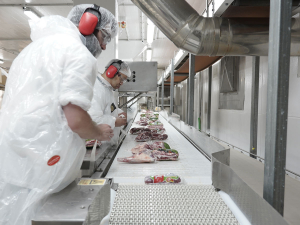Santa's present for the primary sector - an FTA with India
Primary sector leaders have welcomed the announcement of a Free Trade Agreement between India and New Zealand.
 The Meat Industry Association says the extra 500 overseas workers will help but there are about 2,000 vacancies currently in the meat industry around NZ.
The Meat Industry Association says the extra 500 overseas workers will help but there are about 2,000 vacancies currently in the meat industry around NZ.
An extra 500 workers will certainly help but only if they get here in time.
So says Meat Industry Association chief executive Sirma Karapeeva following the Government's recent decision to allow an additional 500 migrant workers into NZ to work in the meat industry.
Karapeeva says it is great that the Government is actually acknowledging that there is a "real and chronic" labour shortage facing the meat industry and the extra workers will help to alleviate the pressure. But she told Rural News that a question mark hangs over the ability of Immigration NZ to process those visas quickly enough to get them working in NZ within the next month or so.
Karapeeva says there is a lot of pre-application work required, such as the migrants obtaining medical clearances and other checks.
"If a NZ company is working with a good recruiter overseas, that can be streamlined. The question is, once Immigration NZ receives the application, how quickly can they process that application to give the particular person the green light to come to NZ and start work?"
She says past experience suggests that the immigration system is "groaning" and has been for a very long time.
Karapeeva believes this raises the question about whether Immigration NZ will be able to cope with the huge number of applications. She says most of the migrant workers have some skills and will receive additional training when they arrive, and on the job, so there shouldn't be a huge time lag in upskilling these people.
It is estimated there are about 2,000 vacancies in the meat industry around NZ.
"Despite this labour shortage, the processing plants are doing everything they can to operate under such tight conditions, including extending and putting on new shifts," Karapeeva told Rural News.
"But they don't have enough people and that means that the carcass is not fully processed and that means that some value is lost."
She adds that given the current labour shortage, many companies are making hard decisions about whether to drop some of their further processing.
Karapeeva says the advantage of having migrant workers means there is a greater likelihood of having a killing chain operating at full capacity. She says that helps protect all jobs.
Additional reductions to costs for forest owners in the Emissions Trading Scheme Registry (ETS) have been announced by the Government.
Animal welfare is of paramount importance to New Zealand's dairy industry, with consumers increasingly interested in how food is produced, not just the quality of the final product.
Agriculture and Forestry Minister Todd McClay is encouraging farmers and growers to stay up to date with weather warnings and seek support should they need it.
The closure of SH2 Waioweka Gorge could result in significant delays and additional costs for freight customers around the Upper North Island, says Transporting New Zealand.
OPINION: The year has started positively for New Zealand dairy farmers and things are likely to get better.
Ministry for Primary Industries (MPI) Director General Ray Smith believes there is potential for an increase in dairy farming in New Zealand.